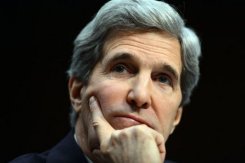
Ten Years of War: For America, Making Mistakes Is Just So Easy
The Iraq War has led to approximately 4,500 American military casualties and more than 30,000 injuries, while Iraqi casualties number in the hundreds of thousands. The war and postwar reconstruction have cost the U.S. over two trillion dollars. The American media calls this a lesson that "makes people understand the limitations of American leadership and strength.”*
However, until today, not one American government official had stood up and apologized for this huge error. None of the decision-makers of the period have paid the price for their actions. The mistake passed through the “proper procedure” of American democracy; the matter is therefore left unresolved.
The Iraqi people have no choice but to let the error rest as it is; their country is approaching division and illegal arms are rampant. Afghanistan and Libya likewise have no hope of forming a stable Western-style democracy. Many of the worst predictions that were made about these countries, which are experiencing religious and ethnic conflict, have come true.
The lesson learned by countries around the world in these past ten years has really been played down in Western (and especially American) reflections. Perhaps this is because those who suffered the most harm were not Western: America is a little ashamed, but can still bear it. There is no lack of misfortune in the world.
China’s connection to the Iraq War does not go so far as direct participation, but China already deals with America more than any other country does. Understanding how headstrong, careless and stubborn this Western “base camp of democracy” can be is of great significance to Chinese national security.
First of all, America is a country easily captured and manipulated by ideology. Once a goal takes shape from that ideology, America’s ability to check and balance itself breaks down and reckless fanaticism, aided by democracy, swiftly proliferates.
Second, America is a society that emphasizes procedure, yet lacks accountability for results. Saddam's “weapons of mass destruction” — which the Iraq War was intended to dispose of — did not exist at all. The price of the war has vastly exceeded predictions, but in terms of culpability, no one can make sense of it.
In America, the deep-rooted social origin of this erroneous war has not been touched. The war has only made the U.S. a little more cautious; its society has not changed its attitude toward the outside world, its feeling of political superiority, or its worship of military strength. The significant factors in America’s decision-making process are still the same as ever.
Today, America’s way of thinking about Syria, Iran and such countries is really no different than it was before the Iraq War. How they tackle the problem, or don’t tackle the problem, makes no difference; American thinking still stays within the same boundaries. In terms of thought, America is a nation overcome by inertia; its ideology is still that of the previous century.
China must deal with the U.S. despite its unwillingness to admit wrongdoing in the Iraq War; therein lies some trouble and risk for China. China does not have the power to change America, but we need to see this nation — which many respect as a “model” nation — without any misconceptions. A clear-headed strategy is extremely valuable.
*Editor’s Note: Although accurately translated, this quotation could not be verified.


